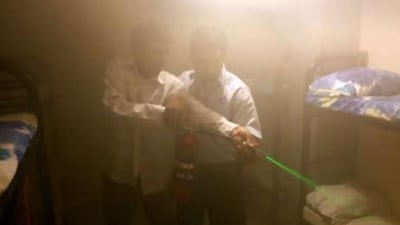ABU DHABI // The rubbish bin inside the labour bunkhouse was alight and smoke was rolling along the camp's roof when Mohammed Roshdi opened the door. The 25-year-old computer assistant with Al Geemi Partners said he had never before been confronted with flames, smoke and the soaring temperatures of a blaze. But he did not hesitate as he entered the room.
"Fire! Fire! Fire!" shouted Mr Roshdi, 25. Deciding he could fight the flames with a nearby extinguisher, he pulled out its pin and took aim at the bin. But the flames were not doused with water or chemicals. Instead, a green laser blasted the blaze. This time, the "fire" was not real. But the simulation gave Mr Roshdi, from Egypt, and about 50 other workers for the company, who live in a partially opened labour accommodation near Mafraq, the experience of battling flames in a realistic setting.
"It is the same room we are living in," he laughed. "The smoke was so heavy, but you can see." With a slew of fires in recent months causing damage to homes and businesses around the country, companies and the Government are renewing their focus on fire safety, putting their staff to the test in a "fire simulator" offered by an Abu Dhabi-based company. Jason Hicks, the operations manager for Hedgehog Safety Consultancy, said the company's mobile "labour camp" was one of only eight in the world. During the simulation, participants must enter the eight-foot-wide bunker and put out a fire in rubbish bin beneath an air conditioning unit, unplugging the unit to take away the source of the fire.
Often, the rubbish will light up again. Their colleagues standing outside can watch the action on a screen showing feeds from a closed-circuit camera inside. After, they put out real flames outside with a water extinguisher. "You feel the smoke, you smell the smoke," said Mr Hicks. "It interferes with your nose, it interferes with your vision, you can feel the heat. We do not want to scare people into being petrified in a situation like this.
"We want them to feel the emotion that they would feel and otherwise only feel for the first time in that situation. We want a culture of fire safety. It is needed in a hot country, dry country with the huge electrical systems that they have." The company trained Western Region Municipality employees in six cities recently and has visited camps around the capital supervised by Adsecc, an Abu Dhabi security firm that employs 300 security guards and supervises more than 60,000 workers in camps.
Adsecc makes fire safety training a priority for camp residents, said Charles Mallice, its director of operations and training. He said that small fires, most of which are electrical, were a "weekly occurrence" in the camps. Common fire-starters were cheap mobile phone chargers or air conditioning units overheating. "People who have been trained contain fires very quickly," Mr Mallice said. Although Civil Defence responds to every fire, having people on hand trained to deal with a blaze in the "first few seconds of the fire" was important, he said.
An illustration of what proper training and information mean was provided yesterday as workers were asked to guess how long a six-kilogram fire extinguisher would work. "If I use this on the fire, how long would it last?" asked Mohammed Ajmal, a fire safety instructor with Hedgehog. "Ten, 15, minutes," one worker guessed. "Five minutes?" The correct answer: 30 seconds. That is not a very long time to put out a fire, he told the staff during the morning's 40-minute lesson, adding that workers should not try to fight a fire "bigger than a waste bin".
Gil Pagkaliwangen, 49, the facility manager for the Al Geemi complex near Mafraq, said fire training he had seen in the country involved simply dousing a real blaze with a hose. This type of training, he added, was a good investment for a facility worth tens of millions of dirhams. More than 3,600 people will be living in the Al Geemi complex within the next couple of months, he said. "I'm worried about the kitchen," the Filipino said. "If these people panic because they have no fire fighting training, the fire will get big."
Members of the company's fire brigade, supervisors and security staff were among those trained yesterday. In all, 130 staff will be trained, with kitchen workers next to learn. @Email:mchung@thenational.ae

